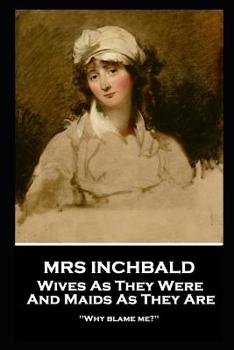Mrs Inchbald - Wives As They Were And Maids As They Are: 'Why blame me?''
Despite the fact that she suffered from a debilitating stammer she was determined to become an actress.
In April 1772, Elizabeth left, without permission, for London to pursue her chosen career. Although she was successful in obtaining parts her audiences, at first, found it difficult to admire her talents given her speech impediment. However, Elizabeth was diligent and hard-working on attempting to overcome this hurdle. She spent much time concentrating on pronunciation in order to eliminate the stammer. Her acting, although at times stilted, especially in monologues, gained praise for her approach for her well-developed characters.
That same year she married Joseph Inchbald and a few months later they appeared for the first time together on stage in 'King Lear'. The following month they toured Scotland with the West Digges's theatre company. This was to continue for several years.
Completely unexpectedly Joseph died in June 1779. It was now in the years after her husband's death that Elizabeth decided on a new literary path. With no attachments and acting taking up only some of her time she decided to write plays.
Her first play to be performed was 'A Mogul Tale or, The Descent of the Balloon', in 1784, in which she also played the leading female role of Selina. The play was premiered at the Haymarket Theatre.
One of the things that separated Elizabeth from other contemporary playwrights was her ability to translate plays from German and French into English for an audience that was ever-hungry for new works.
Her success as a playwright enabled Elizabeth to support herself and have no need of a husband to support her. Between 1784 and 1805 she had 19 of her comedies, sentimental dramas, and farces (many of them translations from the French) performed at London theatres. She is usually credited as Mrs Inchbald.
Mrs Elizabeth Inchbald died on 1st August 1821 in Kensington, London.





